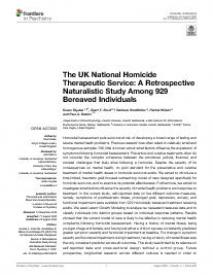The UK National Homicide Therapeutic Service : A Retrospective Naturalistic Study Among 929 Bereaved Individuals
Homicidal bereavement puts survivors at risk of developing a broad range of lasting and severe mental health problems. Previous research has often relied on relatively small and homogenous samples. Still, little is known about what factors influence the expression of symptoms following homicidal bereavement. Preventive and curative treatments often do not consider the complex coherence between the emotional, judicial, financial, and
societal challenges that likely arise following a homicide.
Despite the severity of its consequences on mental health, no gold standard for the preventative and curative treatment of mental health issues in homicide survivors exists. We aimed to introduce a time-limited, traumatic grief-focused outreaching model of care designed specifically for homicide survivors, and to examine its potential effectiveness. Furthermore, we aimed to investigate what factors influence the severity of mental health problems and response to treatment. In the current study, self-reported data on five different outcome measures, namely, symptoms of posttraumatic stress, prolonged grief, depression, anxiety, and functional impairment were available from 929 homicidally bereaved treatment receiving adults. We used Latent Growth Modeling to analyze our repeated measures data and to classify individuals into distinct groups based on individual response patterns.
Results showed that the current model of care is likely to be effective in reducing mental health complaints following homicidal bereavement. Having a history of mental illness, being younger of age and female, and having lost either a child or spouse consistently predicted greater symptom severity and functional impairment at baseline. For change in symptom severity and functional impairment during treatment, having a history of mental illness was the only consistent predictor across all outcomes.
This study was limited by its reliance on self-reported data and cross-sectional design without a control group. Future prospective, longitudinal research across different cultures is needed in order to replicate the current findings and enhance generalizability. That notwithstanding, findings provide a first step toward evaluating a novel service-delivery approach for homicide survivors and provide further insight in the development of mental health complaints following bereavement by homicide.
Geachte bezoeker,
De informatie die u nu opvraagt, kan door psychotraumanet niet aan u worden getoond. Dit kan verschillende redenen hebben,
waarvan (bescherming van het) auteursrecht de meeste voorkomende is. Wanneer het mogelijk is om u door te verwijzen naar de bron
van deze informatie, dan ziet u hier onder een link naar die plek.
Als er geen link staat, kunt u contact opnemen met de bibliotheek,
die u verder op weg kan helpen.
Met vriendelijke groet,
Het psychotraumanet-team.
In: Frontiers in Psychiatry ; ISSN: 1664-0640 | 11 | august | 878
https://doi.org/10.3389/fpsyt.2020.00878


